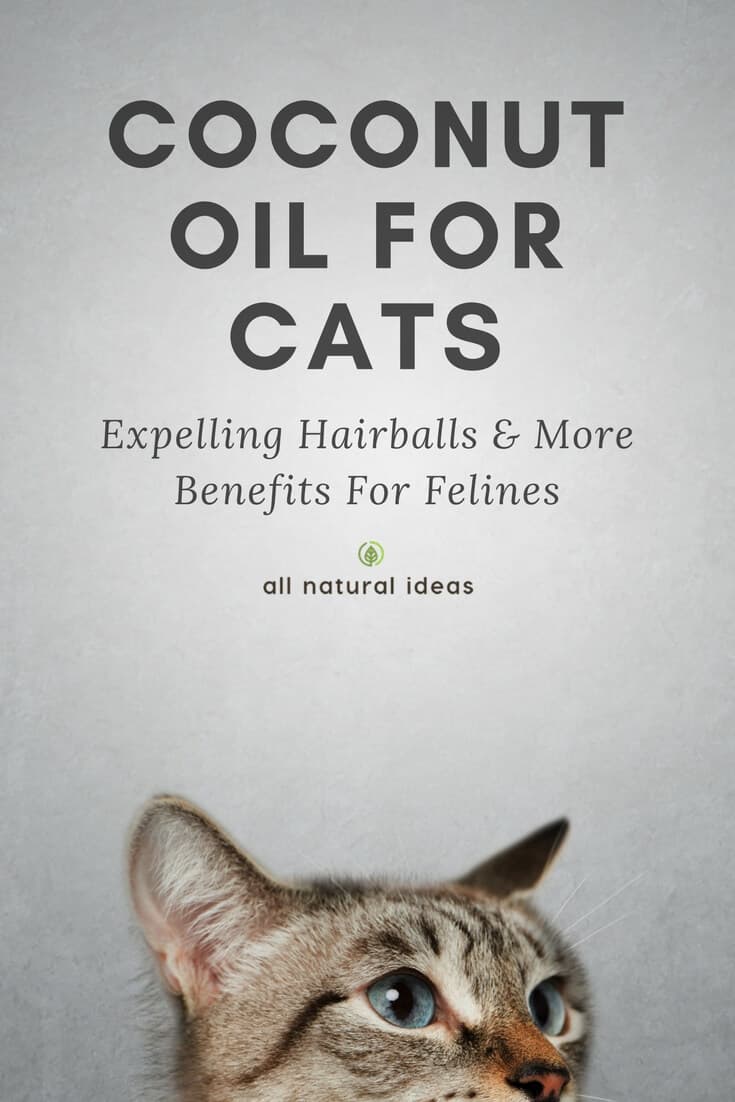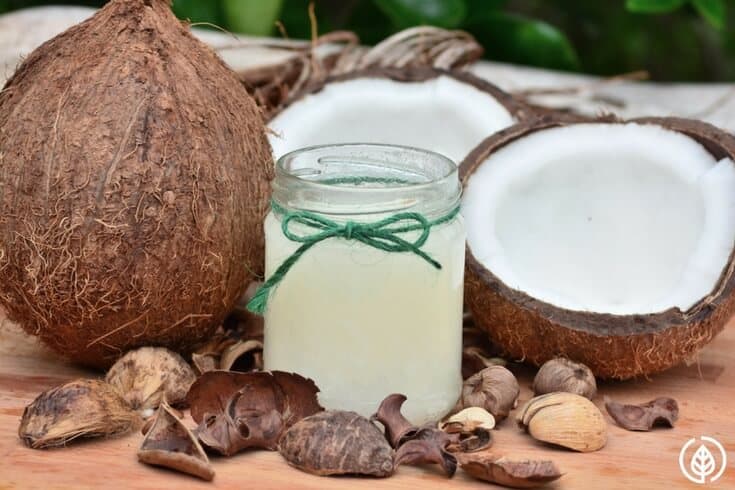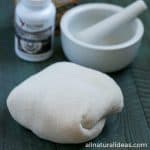Did you know coconut oil for cats is a thing? Yes, even your feline best friend can reap the health benefits. Learn how it can help expel hairballs and more.
You’re already using coconut oil in your recipes and coffee. You’re aware that using a tablespoon of this saturated-fat rich oil is far better for your health than using highly-processed vegetable or seed oils.
And perhaps you’re aware that coconut oil can help treat cold sores and keratosis pilaris (chicken skin). Maybe you even know about using coconut oil for other skin conditions, as well as for hair and even arthritis.
But there’s a good chance you’re less familiar with coconut oil for cats….
Benefits of Coconut Oil for Cats
Let’s start off with the most common way to use coconut oil for cats. It’s the most popular use for coconut oil in humans: as a food. Adding a bit of coconut oil to your cat’s food may benefit your feline friend’s health for a number of reasons.
The first reason doesn’t usually pertain to humans. You see, most dogs and cats suffer from chronic dehydration. That’s because most dog and cat owners exclusively feed their pets dry food.
Cats (and dogs) need a diet containing 80% moisture. However, dry food contains only 10-15% moisture. Adding a bit of coconut oil adds some moisture. And all it takes is one-eighth or one-quarter tablespoon.
Saturated fats have a bad reputation. Most mainstream doctors, health organizations and dieticians consider them a dietary taboo. However, the vast majority of saturated fats come from animal sources (thankfully, not cats, at least not in North America).
Coconuts are that rare source of plant-based saturated fat. And it’s the trio of fatty acids in coconut oil—lauric, capric and caprylic acid—that offer the proven anti-bacterial and anti-inflammatory properties of coconut oil. (Dr. Axe, a natural health TV personality, adequately defends the use of coconut oil on his website.)
And your cat might just derive the same benefits from coconut oil as well. Let’s take a look at some more health benefits of coconut oil for cats….
Coconut oil for cats teeth
Let’s face it. Some cats have horrible breath. But that’s true of any species. Rotten cat breath, though, has a distinct odor to it. And if you can relate (not to say your own breath stinks, but your cat’s does), then coconut oil may help.
That’s because in research studies like this one, lauric acid, one of the three main fatty acids in coconut oil, demonstrates both antimicrobial and anti inflammatory properties. Gingivitis and excess plaque build-up are two primary causes of bad breath.
Any condition that ends with “itis” is a symptom of inflammation. Thus, because lauric acid fights inflammation, it might just help nib your cat’s bad breath in the bud.
WildernessCat.com recommends giving your cat one teaspoon of coconut oil for every 10 pounds it weighs. And it give it to your cat every day. Although, other online sources and veterinary experts suggest using it sparingly.
But that’s for all-around purposes. Indeed, if your cat has terrible breath, a daily dose might have to do. WildernessCat.com recommends applying the oil directly to your cat’s teeth and gums.
Keep in mind there are no studies proving that coconut oil for feline dental care works, let alone what a proper dose for it is.
Coconut oil for skin
Perhaps the most common use for coconut oil for cats is for skin and fur. According to a holistic veterinarian quoted in this article on PetMD, coconut oil can help with allergies, dry skin, itchiness, and overall coat health. It may even help alleviate symptoms of dermatitis.
Also, just as in humans, coconut oil can help treat wounds. The severity of abscess and other infections may lessen with continued use of coconut oil.
But here’s the thing with using coconut oil on your cat’s skin….
Cats will lick it off. So who knows if applying coconut oil on cat skin actually works. If you want to try it, you’ll have to be vigilant and try not to let your cat lick its wounds.
Furthermore, Catalogical.com says to apply coconut oil around the wound, not on it (although the reason why is not explained). Catalogical also offers another ingenious way of helping your cat with coconut oil: rub some on its paws before your it goes outside.
Presumably, the article is suggesting that if you let your cat go outside and there are rough or hot surfaces, coconut oil may ease paw burn.
In general, putting some coconut oil on your cat’s skin or fur is likely safe. If your cat has fleas, give it a try. And it might help with other minor skin irritations.
However, if your kitty is overweight, keep in mind that coconut oil is high in calories. If your cat’s going to lick all the coconut oil you apply to the skin, that’s not going to help it lose weight.
Coconut oil for cats for cats constipation
Sometimes, just like us, kitty can’t go poo-poo. The tell tale signs include a couple pebbles in the kitty litter or even blood spotting from straining. Go back to the beginning of this post. Remember the fact that cat food ideally should be 80% moist. And most cat food is only 15% moisture? Well, this could be one reason that your cat is constipated.
However, before feeding your cat a huge spoonful of coconut oil, keep in mind that because your cat’s digestive system isn’t used to it, coconut oil may cause diarrhea. Because of this, start small. Only give about ¼ to ½ teaspoon once or twice a day to start.
These two crazy cat ladies successfully used coconut oil for their cat’s constipation (along with other natural remedies).
Coconut Oil for Cats: Other Uses
Other anecdotal evidence claims that coconut oil, when fed to cats, can boost kitty’s immunity. As well as aid digestion and even help eliminate the bane of every kitty: hairballs.
How can coconut oil neutralize hairballs? It all comes down to moisture. Coconut oil lubricates the GI tract. Thus, instead of being stuck, coconut oil may help move the hairball along. Although, to be sure, other oils may help with this as well.
Coconut oil for cats: are there side effects?
Quick one-question quiz: remember the three beneficial fatty acids in coconut oil? No? Well, to remind you, they are lauric acid, capric acid, and caprylic acid.
When digested, lauric acid metabolizes into monolaurin. Monolaurin is another type of fatty acid. Studies (like this one) demonstrate lauric acid kills harmful bacteria and other microscopic nasties.
However, if your cat is obese or has inflammation of the pancreas, avoid feeding it coconut oil. And if your cat has one or both of these conditions and you just want to apply coconut oil to your cat’s skin, you’ll need to make sure your cat won’t lick it off.
In addition, make sure if you’re going to feed your cat coconut oil, you buy virgin or extra virgin coconut oil. Do not use a cheap coconut oil that’s been refined. Any oil that has been processed can cause inflammation.
And if you’re wondering if there’s a coconut oil specifically for pets, you’re in luck. There’s this one.








